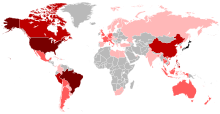Our website is made possible by displaying online advertisements to our visitors.
Please consider supporting us by disabling your ad blocker.
Japanese people
This article does not have any sources. (December 2022) |
Japanese: 日本人 | |
|---|---|
 | |
| Regions with significant populations | |
| 2,000,000 | |
| 1,469,637 | |
| 120,000 | |
| 109,740 | |
| 103,182[1] | |
| 102,066[2] | |
| 94,942[8] (2022)note | |
| 86,143[9] (2022) | |
| 78,431[8] (2022)note | |
| 76,440[10] (2020) | |
| 65,022[8] (2022)note | |
| 42,266[8] (2022)note | |
| 41,717[8] (2022)note | |
| 36,104[8] (2022)note | |
| 32,743[8] (2022)note | |
| 27,429 (2015)[1] (0.3% of Hong Kong's population) | |
| 24,545[8] (2022)note | |
| 21,819[8] (2022)note | |
| 20,345[8] (2022)note | |
| 20,000[11][better source needed] (2018) | |
| 19,612 Recorded From 38,135+ (2019) [1] | |
| Japanese nationals
16,894 (Oct. 2019)[1] People of Japanese descent 120,000[2][3][4][5] (2006) | |
| 18,141[1] | |
| 12,000 | |
| 9,363 (2022)[1] | |
| 8,145 (October 2022)[1][2][3] | |
| 8,080 (October 2015)[1] | |
| 5,000 | |
| 4,000 | |
| 3,800[1] | |
| 3,059 | |
| 1,107 (2016)[1] | |
| 678 (2022)[1][2] | |
| Languages | |
| Japanese | |
| Religion | |
| Shinto, Buddhism | |
Japanese people are a ethnic group and nation native to Japan. They are ethnically closely akin to other peoples of eastern Asia.[3]
Previous Page Next Page


